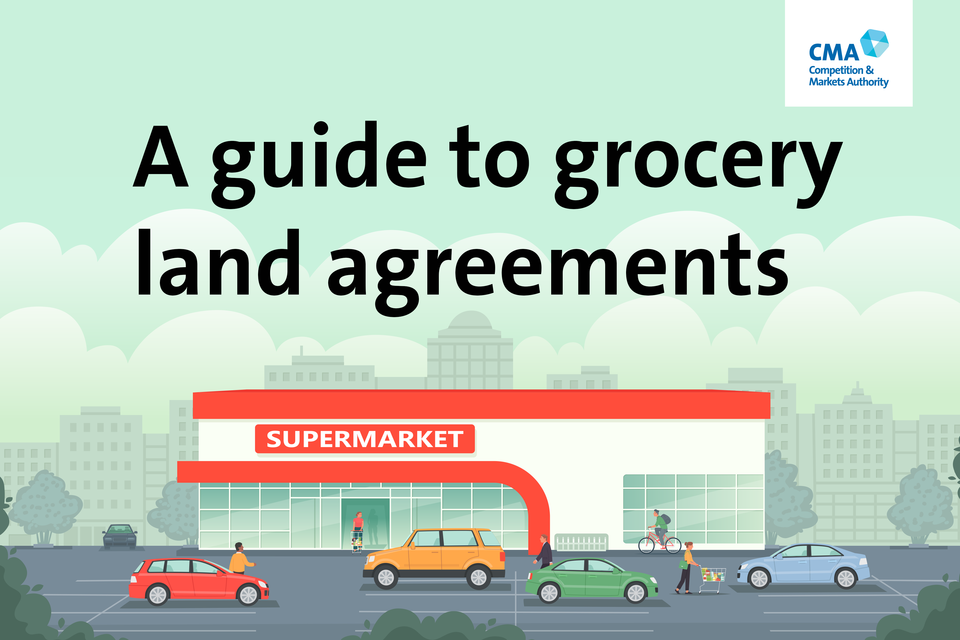Check your grocery land agreements
Updated 27 November 2020

A guide to controlled land agreements
The Groceries Market Investigation (Controlled land) Order 2010 is designed to stop large supermarkets from blocking other grocery businesses from opening their shops nearby.
The supermarkets that the Order currently applies to are:
- Tesco
- Sainsbury’s
- Morrisons
- Asda
- Co-op
- Waitrose
- Marks and Spencer (M&S)
Prohibited agreements
Certain types of agreements that prevent other grocery stores from opening near to any of the 7 designated supermarkets in any UK location are against the law.
There should be none of the relevant restrictions on grocery retailing in the land agreements of designated supermarkets or relating to land on which a designated supermarket would like to open a grocery store.
Long-term exclusivity arrangements
Long-term exclusivity arrangements occur when a business agrees to restrict the sale of groceries on land and the arrangement benefits itself or another business for a 5-year period. Typically, these arrangements are made in the development stages of a retail park or shopping centre.
Any exclusivity arrangement which restricts the sale of groceries to the benefit of one of the 7 supermarkets for more than 5 years may be in breach of the Order.
Restrictive covenants
A restrictive covenant prevents others from using land owned by a business for certain purposes. The Order prohibits designated supermarkets from entering into, or requiring others to enter into, an agreement that prevents the retailing of groceries on the land they own.
There are 2 exceptions to this described below.
Exceptions for grocery land agreements
The 2 exceptions to the ban on restrictive covenants apply to:
-
land supporting a grocery store, including car parks, service yards or access roads; and
-
land that hasn’t been previously used for grocery retailing and where the designated supermarket’s pension supplier has entered into the agreement.
A restrictive covenant preventing grocery retailing which does not come under the exceptions outlined above may be in breach of the Order.
Principles
When reviewing land agreements involving designated supermarkets there should be no:
-
restrictions that benefit a designated supermarket while preventing the retailing of groceries
-
exclusivity arrangements in place relating to grocery retailing that have a duration of more than 5 years
-
restrictive covenants preventing grocery retailing that benefit a designated supermarket apart from the exceptions
If there are any land agreements that prevent others from grocery retailing, these agreements should be checked against the prohibited restrictions described in the previous section.
Advice and further information
Read the Order
It’s important that all relevant businesses and their advisers are familiar with the Groceries Market Investigation (Controlled land) Order 2010.
Legal advice
Businesses are responsible for seeking their own legal advice and ensuring they are compliant with the Order. If you have in place, or are thinking of entering into, a land agreement which, having read the Order, may be within the scope of the prohibitions, you should seek legal advice on this.
CMA test
Upon request, the CMA can carry out a test to determine, where needed, whether a particular Restriction is banned by the Order. Contact the CMA if you represent:
- a grocery retailer which is prevented from opening a store in contravention of the Order
- one of the designated supermarkets that the Order applies to and you find a banned Restriction in your portfolio
- a landowner or property developer and you find a banned Restriction in your portfolio which benefits one of the designated supermarkets that the Order applies to
Contact: RemediesMonitoringTeam@cma.gov.uk
Please note: This document does not set out the CMA’s view of the law exhaustively and guidance from the CMA is not legal advice.

